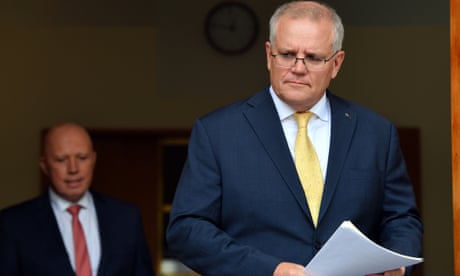- by foxnews
- 08 Apr 2025
Morrison wants khaki election but voters aren’t convinced Coalition best to handle war, survey suggests
Morrison wants khaki election but voters aren’t convinced Coalition best to handle war, survey suggests
- by theguardian
- 08 Mar 2022
- in news

Scott Morrison has declared the Coalition the "proven choice" of voters when it comes to managing Australia's national security interests, but the latest Guardian Essential poll suggests respondents do not believe his government would handle the war between Russia and Ukraine any better than Labor.
While the Coalition traditionally leads Labor on national security issues, the latest poll of 1,093 respondents has found voters do not yet have a clear preference, at least when it came to the Russian invasion.
Asked which political party was better equipped to understand and react to the current conflict between Russia and Ukraine, 24% of respondents said the Coalition, 24% said Labor, 33% said the stripe of the government made no difference, and 19% said they did not know.
There was no unanimity about which party would best handle Australia's response to the conflict, but a majority of respondents supported the Morrison government's decision to provide military support to Ukraine to strengthen that country's defences (57% were in favour, 16% opposed, while 27% neither supported nor opposed). This decision was supported by Labor.
A larger majority of 68% also supported Australia supplying aid to Ukraine and taking refugees fleeing the conflict (10% of respondents were opposed to this, while 22% neither supported nor opposed humanitarian support).
With the federal election now only weeks away, the Morrison government has pivoted away from pandemic management, and ramped up a domestic partisan brawl about national security, contending Labor is Beijing's candidate at the coming poll.
Morrison has tried to set up a khaki election contest, with global and regional instability as the backdrop. The prime minister hopes those atmospherics will benefit the incumbents.
The change in the national conversation does not appear to have delivered a decisive benefit to the Coalition politically, although the latest data showed Labor's primary vote had dropped three points in a fortnight. That negative movement was inside the Guardian Essential poll's margin of error, which is plus or minus three points.
More ominously for Morrison, the latest poll charts a steady increase in the number of voters who signalled it was time to change government.
Last August, 36% of respondents said the Morrison government deserved to be re-elected. That was now down to 32%. Last August, 41% of respondents said it was time to give someone else a go at government. That was now up to 48% - a seven point negative movement for the Coalition in as many months.
Voting intention figures, calculated by Guardian Essential, now expresses the head-to-head metric of the major party contest as two-party preferred "plus", rather than the standard two-party preferred measure. This change in methodology, adopted after the 2019 election, highlights the proportion of undecided voters in any survey, providing accuracy on the limits of any prediction.
A fortnight ago, Labor was on 49% (up two points from the previous survey) and the Coalition on 45% (down one point), with 6% of respondents undecided in the two-party preferred "plus" measure. Labor's primary vote was 38%, up from 35% the previous fortnight, and the Coalition was on 35%, down from 37%, with the number of undecided voters going from 8% to 6%.
In the latest survey, Labor's primary vote is 35% (down three points), the Coalition on 36% (up one point) and the Greens on 10%. The latest two-party preferred "plus" result was basically unchanged in the current fortnight's data, with Labor on 49%, the Coalition on 44%, and 7% of respondents undecided.
Morrison remained ahead of his opponent on the better prime minister measure, preferred by 42% of respondents, while Anthony Albanese was on 34%, with 24% of respondents undecided.
While the picture is level nationally, the data does suggest the Coalition has improved its position in Queensland over the past fortnight. In terms of primary voting intention, Labor has dropped from 39% to 29%, and the Coalition has gone from 34% to 40%.
The Coalition enjoys a substantial electoral buffer in Queensland, courtesy of significant swings against Labor at the 2019 election. Labor is targeting four seats in the looming contest - Brisbane, Longman, Flynn and Leichardt. Albanese would struggle to form government if Labor achieved a positive swing, but could not gain ground in Queensland.
Respondents were also asked a series of gender equity questions with International Women's Day on 8 March. A majority of respondents (76%) thought there was still some way to go to achieve equality (17% disagreed and 7% were unsure).
A majority (80%) would also favour legislation ensuring male and female employees were paid the same for doing the same work (13% disagreed and 7% were unsure). But a majority (59%) agreed with the statement that "work to achieve gender equality today benefits mostly well-to-do people".
- by foxnews
- descember 09, 2016
Ancient settlement reveals remains of 1,800-year-old dog, baffling experts: 'Preserved quite well'
Archaeologists have recently unearthed the remarkably well-preserved remains of a dog from ancient Rome, shedding light on the widespread practice of ritual sacrifice in antiquity.
read more


